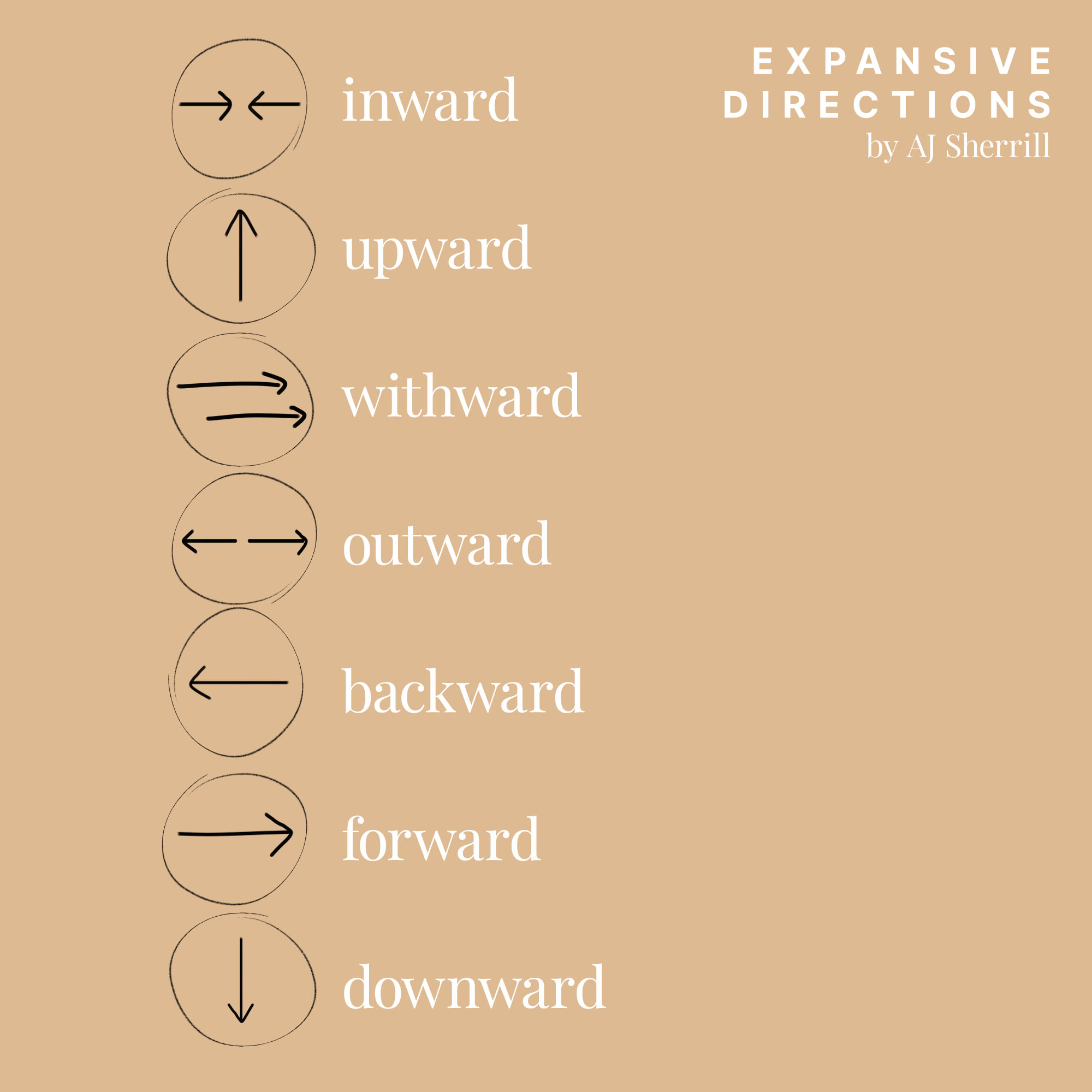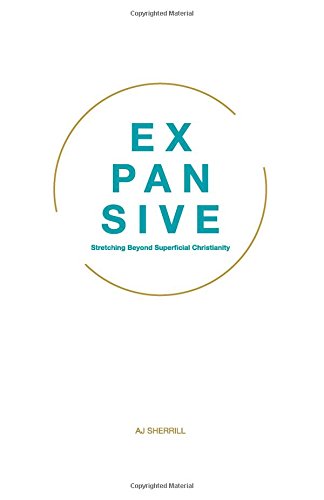Expansive Directions
Last week, we looked at what a framework of apprenticeship is. If you want to read that first, check it out HERE.
This week, we’re looking at another discipleship framework created by Pastor AJ Sherrill. EXPANSIVE is an exceptional discipleship framework that brings a bit more practicality to our spiritual formation. By using the particular language of “directions”, fashioning interesting stories, and building off of ancient practices, Sherrill guides us to see following Jesus as not only just attainable but a journey of fruitfulness. In this blog, I give an overview of his book along with some closing thoughts at the end.

Introduction
“Faith is the opening of all sides and at every level of one’s life to the divine inflow.” -Martin Luther King Jr.
The first thing Sherrill wants to do in this book is bring forth a problem the church has. The problem, of course, is simple: “The Church has a formation problem.” He says that he meets people every week who have attended a church for decades, but only show little spiritual progress. “After years of church commitments, programs, and projects, many Christians don’t feel different; they just feel older.” Just like so many churches (and secular institutions and families I might add), we just focus on our strengths, rather than weaknesses. “This creates an unhealthy pursuit of God over the course of a lifetime.” But Sherrill brings a vision to his book that we all hope for: “We were meant for an expansive spirituality that grows into fullness as we engage our entire beings in pursuit of God’s Kingdom.” Many of today’s discipleship resources give little to no attention to the many different facets of how God made us. “The human experience is dynamic, not static”, Sherrill says. He of course wants to make sure that we understand that we are saved by grace by saying “It is not about earning, but it does require effort.” (He tweaks Dallas Willard’s language here a bit). I’ve mentioned in a previous blog about Vampire Christianity running rampant in our churches. AJ addresses that concept by saying “Most of us settle for partial orientation toward God’s Kingdom when what is needed is comprehensive discipleship…You were not created for spiritual management.”
Sherrill then gives us a framework for discipleship by using directions as the language to guide us. Here are the directions:
- inward
- upward
- withward
- outward
- backward
- forward
- downward.
Each chapter goes through each direction. AJ doesn’t end the introduction there, but gives us a warning for those who think non-discipleship is a viable option. “Every culture is the result of either intention or allowance. Culture is either created intentionally or permitted (allowed) unintentionally.” What he is basically saying is that we are always being spiritually formed into something or someone. To be formed into the image of Christ, we must be intentional. To be formed into the image of the world, we just allow the steady stream to carry us away to destruction.
“Christianity has not been tried and found; it has been found difficult and not tried.” -G.K. Chesterton
INWARD
“The desert journey is one inch long and many miles deep. Inward is the only direction of travel.” -Amma Syncletica
The idea with the INWARD direction is simple, but difficult. “Jesus’ first initiative in public ministry was not to make a name for himself. His first initiative was to receive a name for himself. And that name is Beloved. For those who seek to missionally “be love,” they are wise to first “be-loved.” Going INWARD is acquiring a foundation of our identity in Christ. We cannot disciple others if we have not done the deep and formative work of inner healing. After all, “If you want to heal others, you must be healed through waters of life.”
Sherrill then explains that the journey INWARD requires the continual spiritual practice of silence and solitude with God (Check out the resource blog I wrote on silence and solitude HERE). He shares that “We must proactively create this kind of life; otherwise we will live much of our life reactively to the tyranny of the urgent.” This is the hard journey inward.
UPWARD
“We should love God as a smitten lover of the beloved. A lover who is passionately in love would say: ‘But that is everything. That is my life. There is nothing but that; the rest does not count, it is non-existent.'” -John Climacus
“The upward direction stretches us beyond our tendencies to look down, and expands our capacity to encounter a transcendent God on earth.” In other words, God would be happier if we had half as much knowledge and twice as much obedience. Both, corporate worship and private worship is the UPWARD journey. Worship, of course, is more than a song, but a posture of adoration to our Creator. Worship is not motivated by attraction, but formation. We know that we are traveling in the UPWARD direction when our worship is geared towards obedience and holiness rather than just knowing more about Him.
WITHWARD
“Friendship is rentable in Tokyo.” -Chris Colin
In the WITHWARD direction, it’s all about becoming unified with your church community. “Spirituality is always personal, but never private.” We need to be drawn to one another with love because that is how it works. That is how we were created. Communion is not just about our relationship with God, but also about our relationship with our church community.
In the age of technology and social media, “we boast in having more friends than ever before while surrounded by empty chairs around the dinner table. It has been said that ours is a generation living in quiet desperation.” We need to keep the commitments of rootedness, intentionality, and purpose.
OUTWARD
“You say you care about the poor? Then tell me, what are their names?” -Gustavo Gutierrez
Sherrill shares that “many find it easy to open their tables, their homes, and their lives to others, yet do so exclusively toward those with whom they share a similar income bracket, education level, and cultural background. But the nature of biblical hospitality – the nature of the Kingdom – is inconvenience and diversity.” When we choose to follow and love Jesus, we must understand that it means to love those who are on the margins. It also means that we practice loving our enemies, but that’s what Jesus did. We do it through going out and serving them as well as inviting them in for hospitality.
“The belief that God will do everything for man is an untenable as the belief that man can do everything for himself…we must learn that to expect God to do everything while we do nothing is not faith but superstition.” -Martin Luther King Jr.
BACKWARD
“Tradition is not to preserve the ashes, but to pass on the flame.” -Gustav Mahler
Soren Kierkegaard said, “We live life forward, but we understand it backward.” Sherrill explains that “In a subconscious quest for deep Christianity, many are reaching for a faith far beyond fog machines, slogans, and series graphics. The roots of our souls are stretching to find soil that is substantive.” Many Christians – especially in my faith tradition – get weirded out by this concept. We usually have the idea that we don’t need to look back at history because we have it all figured out now. However, “underneath the pursuit of our spiritual ancestry lies a well deep enough to slake the thirst of anyone seeking.” In our bones (and maybe genes), we all thirst for ancient wisdom that supersedes our modern advances – for things that are true regardless of what year it is. “Our backward direction then isn’t merely looking back to the past for some inspiration. It’s a retelling of the past, through the power of the Spirit, in hopes that the same God who moved then will once again move now.”
Why is this important? I feel like he explains our modern evangelical quest for restoration like this: “The martyrs built their faith upon the promise of another Kingdom. These early Christians lived so radically for Jesus they considered it a joy to die for Him. Yet I frequently experience Christians leaving contemporary churches in droves because they don’t have a category for pain.” In order to go forward, we must go backward.
FORWARD
“The end is where we start from.” -T.S. Elliot
It’s important to have a biblical vision for the future holds for the bride of Christ. “The God who acted in the past, and will act in the future is acting now in the present.” Sherrill explains it like this: “In essence, worship is a prophetic protest of the world’s counterfeit programs for happiness. It re-members us with who is truly reigning, and where all of the world is headed. As it turns out, worship in both song and body is a big deal in rehearsing the future.”
What many Christians don’t understand is that our life in Christ doesn’t start when we die and “go to heaven.” It starts right now! Jesus offers us life to the full right now! So why do most Christian refuse to live out the Kingdom of God now? Sherrill says, “The stagnation in the contemporary church is not an issue of access to power, but proper alignment with it.” We must live as if the Kingdom of God is already here – because it is here!
DOWNWARD
“You are wanting to climb a great mountain and the good God is trying to make you descend it; he is waiting for you at the bottom in the fertile valley of humility.” -Therese of Lisieux
Another way to explain the DOWNWARD direction is living a life of humility and service to others. Author, Scott Sauls says, “The best way to measure your desire to serve is to look at how you respond when someone treats you like their servant.” Some may think that the Christian life is full of health, wealth, and prosperity where all our dreams will come true. Once we wake up from that hellish nightmare of selfish ambition, we realize what Jesus calls us to. “When you think about it, it is strange that we are not called to do something great in our first response to God’s lavish grace. Rather, we are called to receive the baptism of humility.”
Dietrich Bonhoeffer says, “When Christ calls a man, he bids him come and die.” It is a life of denying our fleshly desires and humbling ourselves under the mighty hand of God.
Conclusion
This discipleship framework has many advantages. One, its language of directions is easy to remember for personal discipleship and replicate with discipling others. Also, since many Christians are in different phases of their spiritual journey, there will be some people who have strengths in a few directions, but need to work on the others. Another advantage is that this framework also helps us understand a more wholistic view of Christianity, and not one that is just relegated to going to church on Sundays and have a ‘quiet time’ (whatever that is).
If you want to learn more about this framework for apprenticeship, check out the book by clicking HERE.
Now that you generally understand this framework, what do you think of it? Do you see any holes or things it is missing? Let me know in a comment below. You can also message me on Instagram at @apprenticeofjesus.
Reflection Question
Out of all these directions listed in this framework, what is one that you struggle with? How can you grow in that direction?

Matt Garcia
Author
Matt is an apprentice of Jesus, a husband to Jesika, and a father to three children. He and his family lead a house church in San Antonio, TX. Connect with him on instagram @apprenticeofjesus.

